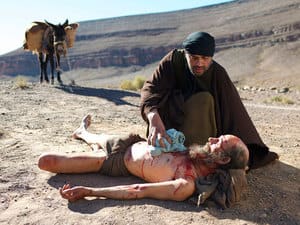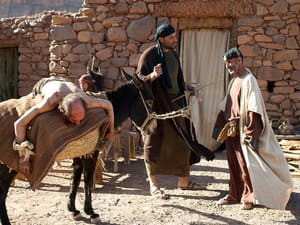
freebibleimages.org/LumoProject
This response is what made Vincent (and indeed all our founders and holy ones) different from other travelers who pretended not to see and walk on by.
Juan Julián Díaz Catalán, CM, author of an article A Samaritan called Vincent de Paul, writes… “There is a common opinion that is accepted by many, namely, that the person who best lived in the manner of the Good Samaritan was Vincent de Paul [1]. In this presentation we attempt to explain this common belief in such a way that we who follow his example may be compelled by his constant charity to continue the Mission of Jesus in the world.”
In this week’s edition of Saturday Study Hall you are invited to read this article with this question in mind. How are the followers of Vincent and Louise challenged to embody the Good Samaritan in our personal lives and organized ministries?
Fr. Catalan begins with an explanation of the words in title of this presentation: the samaritan attitude is a path that enables us to make the gospel effective.
The Samaritan attitude is characterized by the following four movements:
[1] approach and see
The first movement is to approach the individual and not circle around said person. If the Samaritan had not approached the wounded man he would never have seen that the man was still ali
[2] moved with compassion
One begins to be a neighbor at the very moment that one is moved with compassion.

freebibleimages.org/LumoProject
[3] make our assistance effective as we provide for the wounded individual
The Good Samaritan poured oil and wine over the wounds of the man on the road and bandaged those wounds. … the assistance provided by the Samaritan is both personal and institutional … the inn representing the institution. The Samaritan does not use the institution as an excuse to do nothing and he also does not want to take on unnecessary burdens that would exclude others from providing assistance. He helps the wounded man and then moves on.
[4] continue our journey
To love the neighbor means that we respect their freedom and therefore, we know when to move on and go about our business. This demands that we know how and when to cut the bonds created by service … bonds that, if they are not cut, can lead us to glorify ourselves and make those whom we serve dependent upon.
freebibleimages.org/LumoProject
In the following section he presents the Vincentian tradition on the attitude of the Good Samaritan.
3 Vincent and the attitude of the Samaritan as a means to act according to the gospel
- 3.1 Writings of Vincent de Paul
- 3.2 Writings of contemporaries about Saint Vincent
- 3.3 Other significant writings for us
This Vincentian understanding of the attitude of the Good Samaritan has profound implications for the sons and daughters of Vincent today.
4 The attitude of the Samaritan for the sons and daughters of Saint Vincent
- 4.1 Institutional social assistance and personal charity
- 4.2 To serve those in need
- 4.3 The wounded individual is Christ
Father Catalan concludes “We can only worship the Lord when we have begun to serve the neighbor. The Constitutions of the Daughters of Charity state:
“When we are not motivated by love we must then ask what kind of worship has our life become?
“Yes, the Samaritan attitude consists of those four movements that we spoke about before: approach and see, moved with compassion, make our assistance effective as we provide for the wounded individual, and continue our journey. This is a good way to live out the gospel.
“Yes, the man beaten by robbers obliges us to bow down before him … this bowing down is also the posture of adoration and thanksgiving.
“This is the necessary posture of adoration because the wounded individual is Jesus Christ. Vincent de Paul was serious when he said that we must serve the poor with kindness, compassion, cordiality, respect and devotion [27]. There can be no devotion unless there are things that are holy … Vincent asked that we serve the poor with devotion because such activity places us in the presence of God.
“This is also the necessary posture of thanksgiving because we are privileged. To serve and to love the poor is the greatest dignity and most unmerited honor that we can aspire to. Vincent said that the poor are our lords and masters and one of the things that the poor teach us is to fill the very depths of our being with mercy: to expand our hearts so that they become like the heart of Christ.
“And yes, we are confronted with the task of making the gospel effective, but we must remember that if we possessall knowledge and have faith so as to move mountains, if we give away everything we own and hand our body over to the torturers, but do not have love … then we have gained nothing and our activity is meaningless.
Father Catalan is today the Provincial of the Province of Zaragoza in Spanish. He served for many years as Assistant Director of the International Formation Center (CIF) in Paris.
- 1 Introduction
- 2 The Parable of the Good Samaritan (Luke 10:25-37)
- 3 Vincent and the attitude of the Samaritan as a means to act according to the gospel
- 4 The attitude of the Samaritan for the sons and daughters of Saint Vincent
- 5 Conclusion
- 6 Footnotes
Full article is found at http://famvin.org/wiki/A_Samaritan_called_Vincent_de_Paul
The document is also available in Word format Vincent – the good samaritan
Saturday Study Hall is a weekly series exploring the riches of the VIncentian Encyclopedia.






0 Comments